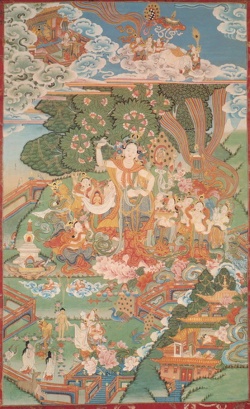Difference between revisions of "Lotsawa"
| Line 1: | Line 1: | ||
[[File:EM-000.JPG|thumb|250px|]] | [[File:EM-000.JPG|thumb|250px|]] | ||
| − | [[Lotsawa]] ([[Tibetan]]: {{BigTibetan|[[ལོ་ཙཱ་བ]]}}, Wylie: [[lo tsA ba]]) is a [[Tibetan]] [[word]] used as a title to refer to the native [[Tibetan]] translators, such as [[Vairotsana]], [[Rinchen Zangpo]], [[Marpa Lotsawa|Marpa]] and others, who worked alongside [[Indian]] [[scholars]] or [[pandita]]s to translate the texts of the [[buddhist canon]] into [[Tibetan]] from [[Sanskrit]], {{Wiki|Chinese}} and other {{Wiki|Asian}} [[languages]]. It is [[thought]] to derive from the [[Sanskrit]] [[locchāva]], which is said to mean ‘bilingual’ or ‘[[eyes]] of the [[world]].’ The term is also used to refer to modern-day translators of [[Tibetan buddhist]] texts. | + | [[Lotsawa]] ([[Tibetan]]: {{BigTibetan|[[ལོ་ཙཱ་བ]]}}, [[Wylie]]: [[lo tsA ba]]) is a [[Tibetan]] [[word]] used as a title to refer to the native [[Tibetan]] [[translators]], such as [[Vairotsana]], [[Rinchen Zangpo]], [[Marpa Lotsawa|Marpa]] and others, who worked alongside [[Indian]] [[scholars]] or [[pandita]]s to translate the texts of the [[buddhist canon]] into [[Tibetan]] from [[Sanskrit]], {{Wiki|Chinese}} and other {{Wiki|Asian}} [[languages]]. It is [[thought]] to derive from the [[Sanskrit]] [[locchāva]], which is said to mean ‘bilingual’ or ‘[[eyes]] of the [[world]].’ The term is also used to refer to modern-day [[translators]] of [[Tibetan buddhist]] texts. [[lotsawa]]: [[Tibetan term for translator]]. |
| − | [[Jnanasutra|Yeshe De]] ([[ye shes sde]]), a [[Nyingmapa]], was the principal [[lotsawa]] of the first wave of translations from [[Sanskrit]] to [[Tibetan]]. | + | [[Jnanasutra|Yeshe De]] ([[ye shes sde]]), a [[Nyingmapa]], was the [[principal]] [[lotsawa]] of the first wave of translations from [[Sanskrit]] to [[Tibetan]]. |
| − | [[Yudra Nyingpo]] (Wylie: [[gyu sgra snying po]]), one of the chief [[disciples]] of [[Vairotsana]], was also a principal [[lotsawa]] of the first translation stage of texts into [[Tibetan]]. | + | [[Yudra Nyingpo]] ([[Wylie]]: [[gyu sgra snying po]]), one of the chief [[disciples]] of [[Vairotsana]], was also a [[principal]] [[lotsawa]] of the first translation stage of texts into [[Tibetan]]. |
{{W}} | {{W}} | ||
Latest revision as of 05:26, 8 April 2014
Lotsawa (Tibetan: ལོ་ཙཱ་བ, Wylie: lo tsA ba) is a Tibetan word used as a title to refer to the native Tibetan translators, such as Vairotsana, Rinchen Zangpo, Marpa and others, who worked alongside Indian scholars or panditas to translate the texts of the buddhist canon into Tibetan from Sanskrit, Chinese and other Asian languages. It is thought to derive from the Sanskrit locchāva, which is said to mean ‘bilingual’ or ‘eyes of the world.’ The term is also used to refer to modern-day translators of Tibetan buddhist texts. lotsawa: Tibetan term for translator.
Yeshe De (ye shes sde), a Nyingmapa, was the principal lotsawa of the first wave of translations from Sanskrit to Tibetan.
Yudra Nyingpo (Wylie: gyu sgra snying po), one of the chief disciples of Vairotsana, was also a principal lotsawa of the first translation stage of texts into Tibetan.
